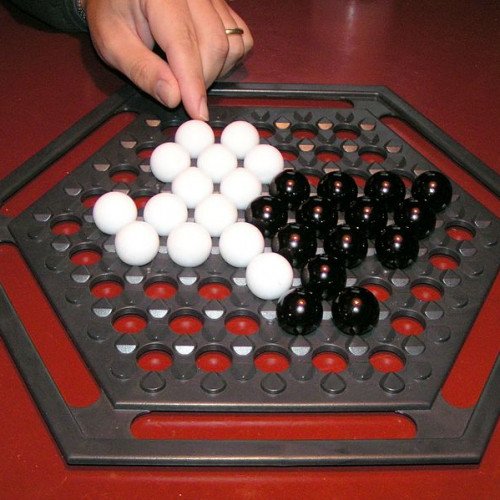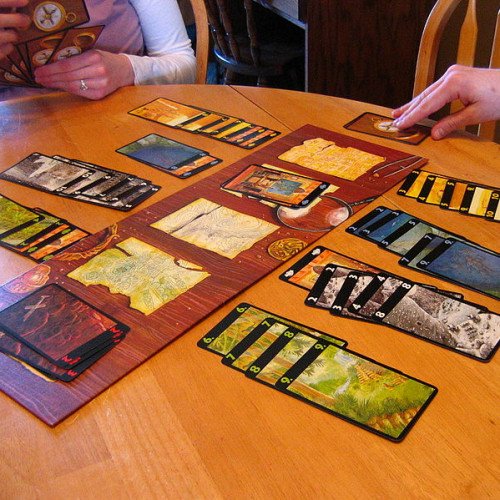ABALONE VS LOST CITIES

ABALONE
Abalone is a two-player abstract strategy board game designed by Michel Lalet and Laurent Lévi in 1987. Players are represented by opposing black and white marbles on a hexagonal board with the objective of pushing six of the opponent's marbles off the edge of the board. Abalone was published in 1990 and has sold more than 4.5 million units. The year it was published it received one of the first Mensa Select awards. It is currently sold in more than thirty countries. The board consists of 61 circular spaces arranged in a hexagon, five on a side. Each player has 14 marbles that rest in the spaces and are initially arranged as shown below, on the left image. The players take turns with the black marbles moving first. For each move, a player moves a straight line of one, two or three marbles of one color one space in one of six directions. The move can be either broadside / arrow-like (parallel to the line of marbles) or in-line / in a line (serial in respect to the line of marbles), as illustrated below. A player can push their opponent's marbles (a "sumito") that are in a line to their own with an in-line move only. They can only push if the pushing line has more marbles than the pushed line (three can push one or two; two can push one). Marbles must be pushed to an empty space (i.e. not blocked by a marble) or off the board. The winner is the first player to push six of the opponent's marbles off of the edge of the board.
Statistics for this Xoptio

LOST CITIES
Lost Cities is a 60-card card game, designed in 1999 by game designer Reiner Knizia and published by several publishers. The objective of the game is to mount profitable expeditions to one or more of the five lost cities (the Himalayas, the Brazilian Rain Forest, the Desert Sands, the Ancient Volcanos and Neptune's Realm). The game was originally intended as a 2-player game, but rule variants have been contributed by fans to allow 1 or 2 further players, causing Reiner Knizia himself to later provide semi-official 4-player rules. Lost Cities is a fast-moving game, with players playing or discarding, and then replacing, a single card each turn. Cards represent progress on one of the five color-coded expeditions. Players must decide, during the course of the game, how many of these expeditions to actually embark upon. Card-play rules are quite straightforward, but because players can only move forward on an expedition (by playing cards which are higher-numbered than those already played), making the right choice in a given game situation can be quite difficult. An expedition that has been started will earn points according to how much progress has been made when the game ends, and after three rounds, the player with the highest total score wins the game. Each expedition that is started but not thoroughly charted incurs a negative point penalty (investment costs). Interaction between players is indirect, in that one cannot directly impact another player's expeditions. However, since players can draw from the common discard piles, they are free to make use of opposing discards. Additionally, since the available cards for a given expedition are finite, progress made by an opponent in a given color can lead to difficulty making progress in that same color. The game's board, while designed to supplement the theme, is optional and consists only of simple marked areas where players place discards. If Lost Cities had four expeditions instead of five, it could be played with a standard deck of playing cards. When doing so, the face cards would represent investment cards, with numbered cards two through ten serving as the expedition progress cards.